FREE 7th Grade New York State Testing Program Math Practice Test
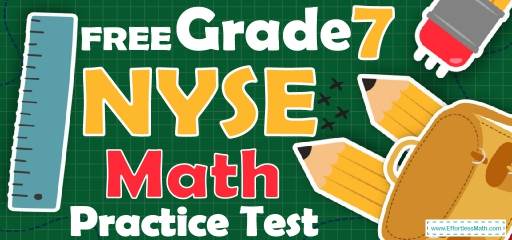
Welcome to our FREE 7th Grade New York State Testing Program Math practice test, with answer key and answer explanations. This practice test’s realistic format and high-quality practice questions can help your student succeed on the 7th Grade New York State Testing Program Math test. Not only does the test closely match what students will see on the real New York State Testing Program, but it also comes with detailed answer explanations.
For this practice test, we’ve selected 20 real questions from past exams for your student’s New York State Testing Program Practice test. Your student will have the chance to try out the most common 7th Grade New York State Testing Program Math questions. For every question, there is an in-depth explanation of how to solve the question and how to avoid mistakes next time.
Use our free 7th Grade New York State Testing Program Math practice tests and study resources (updated for 2022) to help your students ace the 7th Grade NYSE Math test! Make sure to follow some of the related links at the bottom of this post to get a better idea of what kind of mathematics questions students need to practice.
The Absolute Best Book to Ace the 7th Grade New York State Testing Program Math Test
Common Core Math Exercise Book for Grade 7 Student Workbook and Two Realistic Common Core Math Tests
10 Sample 7th Grade NYSE Math Practice Questions
1- What is the slope of a line that is perpendicular to the line \(4x-2y=12\)?
A. \(-2\)
B. 2
C. 4
D. 12
2- Simplify: \(5(x-2y)+(2-x)^2 = (5x-10y)+(4-4x+x^2) = x -10y +4 +x^2\)
When \(x=3\) and \(y=-2\) ,therefore:
\(x -10y +4 +x^2 =3+20+4+9 =36\)
A. \(-4\)
B. 20
C. 36
D. 50
3- The mean of 50 test scores was calculated as 88. But, it turned out that one of the scores was misread as 94 but it was 69. What is the mean?
A. 85
B. 87
C. 87.5
D. 88.5
4- The width of a box is one-third of its length. The height of the box is one-third of its width. If the length of the box is 27 cm, what is the volume of the box?
A. 81 cm\(^3\)
B. 162 cm\(^3\)
C. 243 cm\(^3\)
D. 729 cm\(^3\)
5- In five successive hours, a car travels 40 km, 45 km, 50 km, 35 km, and 55 km. For the next five hours, it travels at an average speed of 50 km per hour. Find the total distance the car traveled in 10 hours.
A. 425 km
B. 450 km
C. 475 km
D. 500 km
6- The ratio of boys to girls in a school is 2:3. If there are 600 students in a school, how many boys are in the school?____________
7- The perimeter of the trapezoid below is 54 cm. What is its area? _________
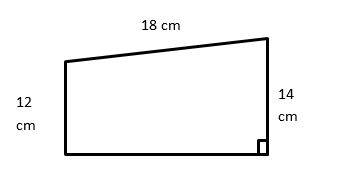
8- In 1999, the average worker’s income increased by \($2,000\) per year starting from a \($24,000\) annual salary. Which equation represents income greater than average? (\(I =\) income, \(x = \)number of years after 1999)
A. \(I > 2000 x + 24000\)
B. \(I > -2000 x + 24000\)
C. \(I < -2000 x + 24000\)
D. \(I < 2000 x – 24000\)
9- Which of the following graphs represents the compound inequality?
A. graph 1

B. graph 2

C. graph 3

D. graph 4

10- A football team had $20,000 to spend on supplies. The team spent \($14,000\) on new balls. New sports shoes cost \($120\) each. Which of the following inequalities represent how many new shoes the team can purchase.
A. \( 120x+14,000 ≤20,000 \)
B. \(120x+14,000 ≥20,000\)
C. \(14,000x+12,0 ≤20,000 \)
D. \( 14,000x+12,0 ≥20,000 \)
11- Two dice are thrown simultaneously, what is the probability of getting a sum of 6 or 9?
A. \(\frac{1}{3}\)
B. \(\frac{1}{4}\)
☐C. \(\frac{1}{6}\)
D. \(\frac{11}{36}\)
12- A swimming pool holds 2,000 cubic feet of water. The swimming pool is 25 feet long and 10 feet wide. How deep is the swimming pool? __________
13- Which graph corresponds to the following inequalities?
\(y≤ x + 4\)
\(2x + y ≤ – 4\)
A.
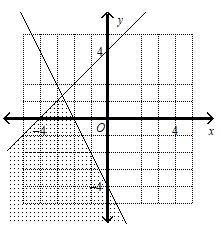
B.
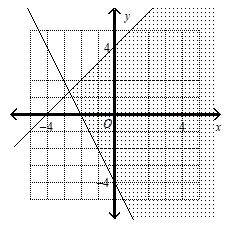
C.
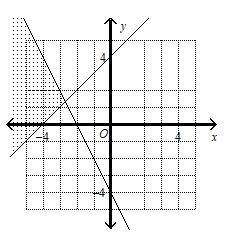
D.
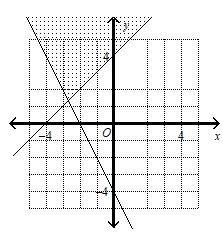
14- A bank is offering \(4.5\%\) simple interest on a savings account. If you deposit $8,000, how much interest will you earn in five years?
A. $360
B. $720
C. $1800
D. $3600
15- A card is drawn at random from a standard 52–card deck, what is the probability that the card is of Hearts? (The deck includes 13 of each suit clubs, diamonds, hearts, and spades)
A. \(\frac{1}{3}\)
B. \(\frac{1}{4}\)
C. \(\frac{1}{6}\)
D. \(\frac{1}{52}\)
16- How long does a 420–miles trip take moving at 50 miles per hour (mph)?
A. 4 hours
B. 6 hours and 24 minutes
C. 8 hours and 24 minutes
D. 8 hours and 30 minutes
17- 11 yards 6 feet and 4 inches equal to how many inches?
A. 388
B. 468
C. 472
D. 476
18- A shirt costing $200 is discounted \(15\%\). After a month, the shirt is discounted another \(15\%\). Which of the following expressions can be used to find the selling price of the shirt?
A. \((200) (0.70)\)
B. \((200) – 200 (0.30)\)
C. \((200) (0.15) – (200) (0.15)\)
D. \((200) (0.85) (0.85)\)
19- Which of the following points lies on the line \(2x + 4y = 10\)
A. \((2, 1)\)
B. \((–1, 3)\)
C. \((–2, 2)\)
D. \((2, 2)\)
20- \(5 + 8 × (–2) – [4 + 22 ×5] ÷ 6 = \)?
A. \(-30\)
B. \(-20\)
C. \(-10\)
D. 0
Best 7th Grade New York State Testing Program Math Workbook Resource for 2022
Answers:
1- A
The equation of a line in slope intercept form is: \(y = mx + b\)
Solve for \(y\).
\(4x-2y=12 ⇒ -2y=12-4x ⇒ y=(12-4x)÷(-2) ⇒ y=2x-6\)
The slope of this line is 2.
The product of the slopes of two perpendicular lines is\( -1\).
Therefore, the slope of a line that is perpendicular to this line is:
\(m_1 × m_2 = -1 ⇒ 2 × (m_2) = -1 ⇒ (m_2) = -\frac{1}{2}\)
2- C
Simplify: \(5(x-2y)+(2-x)^2 = (5x-10y)+(4-4x+x^2) = x -10y +4 +x^2\)
When \(x=3\) and \(y=-2\) ,therefore:
\(x -10y +4 +x^2 =3+20+4+9 =36\)
3- C
\(average (mean) = \frac{sum \space of \space terms }{number \space of \space terms}⇒ 88 = \frac{sum \space of \space terms}{50}⇒ sum = 88 × 50 = 4400\)
The difference of 94 and 69 is 25. Therefore, 25 should be subtracted from the sum.
\(4400 – 25 = 4375\)
\(mean =\frac{sum \space of \space terms}{number \space of \space terms}⇒ mean = \frac{4375 }{50}= 87.5\)
4- D
If the length of the box is 27, then the width of the box is one-third of it, 9, and the height of the box is 3 (one-third of the width). The volume of the box is:
\(V=lwh = (27) (9) (3) = 729\)
5- C
Add the first 5 numbers. \(40 + 45 + 50 + 35 + 55 = 225\)
To find the distance traveled in the next 5 hours, multiply the average by number of hours.
\(Distance = Average × Rate = 50 × 5 = 250\)
Add both numbers.
\(250 + 225 = 475\)
6- 240
The ratio of boys to girls is 2:3. Therefore, there are 2 boys out of 5 students. First, divide the total number of students by 5, then multiply the result by 2.
\(600 ÷ 5 = 120 ⇒ 120 × 2 = 240\)
7- 130
The perimeter of the trapezoid is 54 cm.
Therefore, the missing side (high) is \(= 54 – 18 – 12 – 14 = 10\)
Area of a trapezoid:
\( A = \frac{1}{2}h (b_1 + b_2) = \frac{1}{2}(10) (12 + 14) = 130\)
8- A
Let \(x\) be the number of years. Therefore, $2,000 per year equals 2000\(x\).
starting from $24,000 annual salary means you should add that amount to 2000\(x\).
Income more than that is:
\(I > 2000x + 24000\)
9- D
Solve for \(x\).
\(-2≤2x-4<8 \)⇒ (add 4 all sides)\( -2+4≤2x-4+4<8+4 \)
\(⇒ 2≤2x<12 \)
⇒ (divide all sides by 2)\( 1≤x<6\)
\(x\) is between 1 and 6.
10- A
Let \(x\) be the number of new shoes the team can purchase. Therefore, the team can purchase 120 \(x\).
The team had $20,000 and spent $14000. Now the team can spend on new shoes $6000 at most.
Now, write the inequality:
\(120x+14.000 ≤20.000\)
11- B
For Sum 6: (1 & 5) and (5 & 1), (2 & 4) and (4 & 2), (3 & 3), so we have 5 options.
For sum 9: (3 & 6) and (6 & 3), (4 & 5) and (5 & 4), we have 4 options.
To get a sum of 6 or 9 for two dice: \(5+4=9\)
Since we have \(6 × 6 = 36\) total options, the probability of getting a sum of 6 and 9 is 9 out of 36 or \(\frac{1}{4}\).
12- 8
Use formula of rectangle prism volume.
\(V = (length) (width) (height) ⇒ 2000 = (25) (10) (height)\)
\( ⇒ height = 2000 ÷ 250 = 8\)
13- A
For each option, choose a point in the solution part and check it on both inequalities.
A. Point \((–4, –4)\) is in the solution section. Let’s check the point in both inequalities.
\(–4 ≤ – 4 + 4, \space It \space works\)
\(2 (–4) + (–4) ≤ –4 ⇒ – 12 ≤ – 4\) it works (this point works in both)
B. Let’s choose this point \((0, 0)\)
\(0 ≤ 0 + 4, \space It \space works\)
\(2 (0) + (0) ≤ –4, \space \space That’s \space not \space true!\)
C. Let’s choose this point \((–5, 0)\)
\(0 ≤ –5 + 4, \space That’s \space not \space true!\)
D. Let’s choose this point \((0, 5)\)
\(5 ≤ 0 + 4, \space That’s \space not \space true!\)
14- C
Use simple interest formula:
I=prt
(I = interest, p = principal, r = rate, t = time)
\(I=(8000)(0.045)(5)=1800\)
15- B
The probability of choosing a Hearts is \(\frac{13}{52}=\frac{1}{4}\)
16- C
Use distance formula:
\(Distance = Rate × time ⇒ 420 = 50 × T\)
divide both sides by 50.
\(\frac{420}{50} = T ⇒ T = 8.4 \space hours\)
Change hours to minutes for the decimal part.
\(0.4 \space hours = 0.4 × 60 = 24 \space minutes\)
17- C
\(11 × 36 + 6 × 12 + 4 = 472\)
18- D
To find the discount, multiply the number by (\(100\% – \)rate of discount).
Therefore, for the first discount we get:
\((200) (100\% – 15\%) = (200) (0.85) = 170\)
For the next \(15%\) discount: \((200) (0.85) (0.85)\)
19- B
Input \((-1, 3)\) in the \(2x + 4y = 10\) formula instead of \(x\) and y. So we have:
\( 2(-1) + 4(3) = 10\)
\(-2 + 12 = 10\)
20- A
Use PEMDAS (order of operation):
\(5 + 8 × (–2) – [4 + 22 ×5] ÷ 6 = 5 + 8 × (–2) – [4 + 110] ÷ 6 = 5 + 8 × (–2) – [114] ÷ 6 = 5 + (–16) – 19 = 5 + (–16) – 19 = –11 – 19 = –30\)
Looking for the best resource to help you succeed on the 7th Grade NYSE Math test?
The Best Books to Ace the 7th Grade New York State Testing Program Math Test
Common Core Math Exercise Book for Grade 7 Student Workbook and Two Realistic Common Core Math Tests
Related to This Article
More math articles
- How to Graph Exponential Functions?
- Top 10 OAR Math Practice Questions
- How to Write a Good Mathematics Dissertation on a Top Mark?
- How to Use Measures of Center and Spread to Compare Populations
- 6th Grade NYSE Math FREE Sample Practice Questions
- 4th Grade OAA Math Worksheets: FREE & Printable
- FREE 3rd Grade MCAS Math Practice Test
- Number Properties Puzzle – Challenge 9
- Linear Differential Equations: Bridging Mathematics with Practical Applications
- How to Solve Multi-step Word Problems for Finding Starting and Ending Times
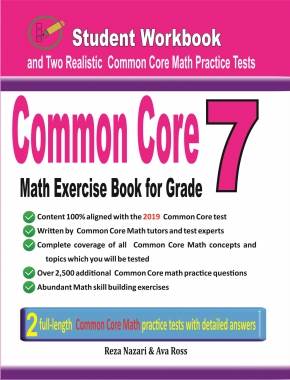
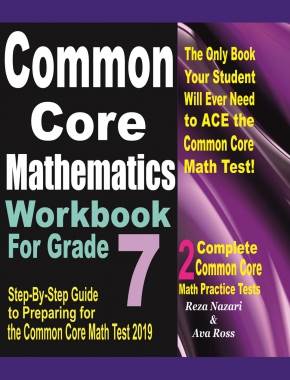

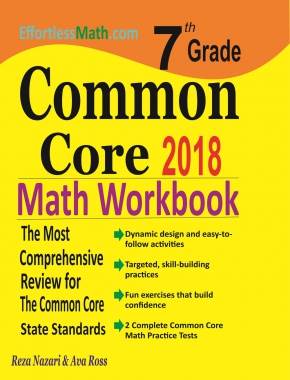
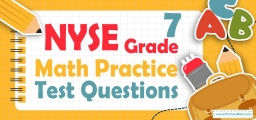
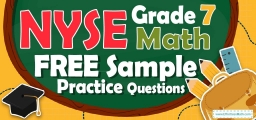
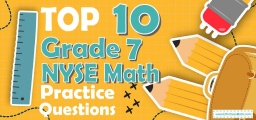
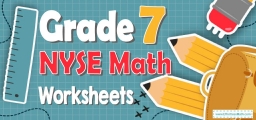
What people say about "FREE 7th Grade New York State Testing Program Math Practice Test - Effortless Math: We Help Students Learn to LOVE Mathematics"?
No one replied yet.